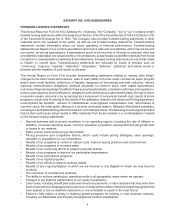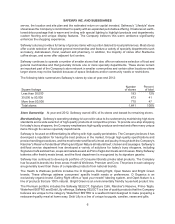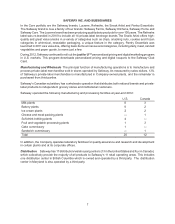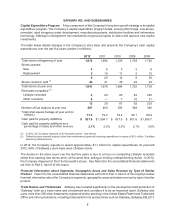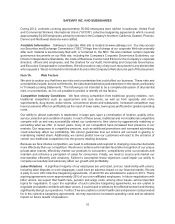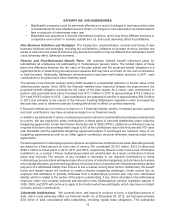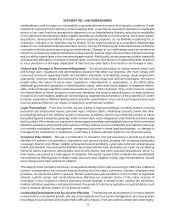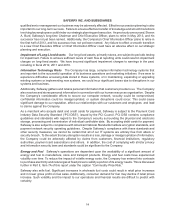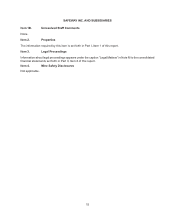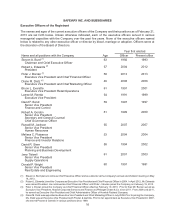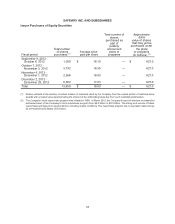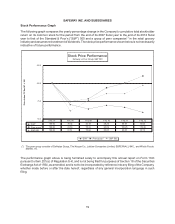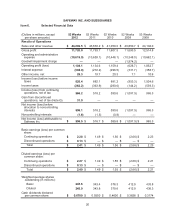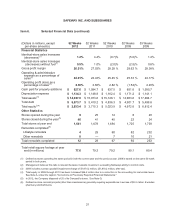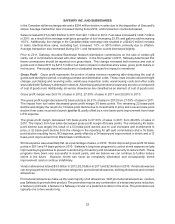Safeway 2012 Annual Report Download - page 26
Download and view the complete annual report
Please find page 26 of the 2012 Safeway annual report below. You can navigate through the pages in the report by either clicking on the pages listed below, or by using the keyword search tool below to find specific information within the annual report.SAFEWAY INC. AND SUBSIDIARIES
14
qualified senior management our business may be adversely affected. Effective succession planning is also
important to our long-term success. Failure to ensure effective transfer of knowledge and smooth transitions
involving key employees could hinder our strategic planning and execution. As previously announced, Steven
A. Burd, Safeway's long-time Chairman and Chief Executive Officer, plans to retire in May 2013, and his
successor has not yet been named. Additionally, the Company's Chief Information Officer plans to retire in
the first half of 2013, and his successor has not yet been named. Any failure to effect a smooth transition
to a new Chief Executive Officer or Chief Information Officer could have an adverse effect on our strategic
planning and execution.
Impairment of Long-Lived Assets Our long-lived assets, primarily stores, are subject to periodic testing
for impairment. Failure to achieve sufficient levels of cash flow at reporting units could result in impairment
charges on long-lived assets. We have incurred significant impairment charges to earnings in the past,
including in fiscal 2012, 2011 and 2010.
Information Technology Risks The Company has large, complex information technology systems that
are important to the successful operation of its business operations and marketing initiatives. If we were to
experience difficulties accessing data stored in these systems, or in maintaining, expanding or upgrading
existing systems or implementing new systems, we could incur significant losses due to disruptions in our
systems and business.
Additionally, Safeway gathers and retains personal information that customers provide to us. The Company
also receives and stores personal information in connection with our human resources organization. Despite
the Company’s considerable efforts to secure our computer network, security could be compromised,
confidential information could be misappropriated, or system disruptions could occur. This could cause
significant damage to our reputation, affect our relationships with our customers and employees and lead
to claims against the Company.
As a merchant who accepts debit and credit cards for payment, Safeway is subject to the Payment Card
Industry Data Security Standard (“PCI DSS”), issued by the PCI Council. PCI DSS contains compliance
guidelines and standards with regard to the Company’s security surrounding the physical and electronic
storage, processing and transmission of individual cardholder data. By accepting debit cards for payment,
Safeway is also subject to compliance with American National Standards Institute encryption standards, and
payment network security operating guidelines. Despite Safeway's compliance with these standards and
other security measures, we cannot be certain that all of our IT systems are entirely free from attack or
security breach. To the extent that any disruption results in a loss, damage or misappropriation of information,
the Company could be adversely affected by claims from customers, financial institutions, regulatory
authorities, payment card associations and others. In addition, the cost of complying with stricter privacy
and information security laws and standards could be significant to the Company.
Energy and Fuel Safeway’s operations are dependent upon the availability of a significant amount of
energy and fuel to manufacture, store and transport products. Energy and fuel costs have experienced
volatility over time. To reduce the impact of volatile energy costs, the Company has entered into contracts
to purchase electricity and natural gas at fixed prices to satisfy a portion of its energy needs. This is discussed
further in Part II, Item 7A of this report under the caption “Commodity Price Risk.”
Safeway also sells fuel. Significant increases in wholesale fuel costs could result in retail price increases
and in lower gross profit on fuel sales. Additionally, consumer demand for fuel may decline if retail prices
increase. Such volatility and the impact to our operations and financial results are difficult to predict with
certainty.


